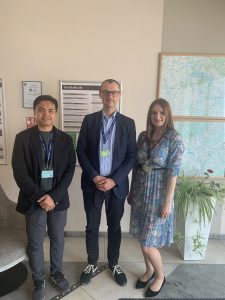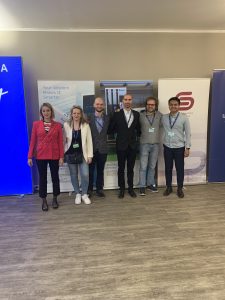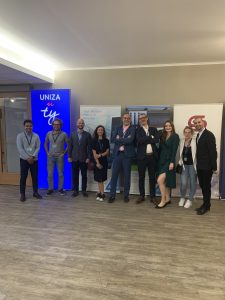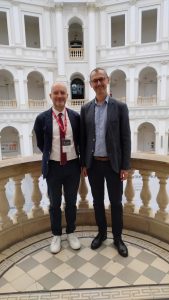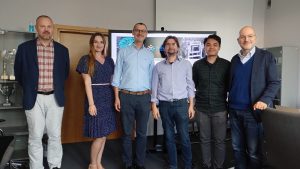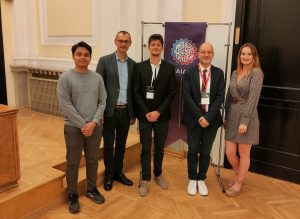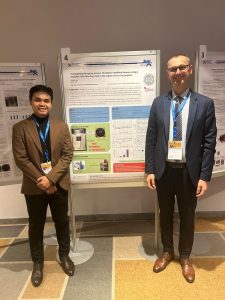
Weave-UNISONO 2022-2026
Project title: Advanced approaches for determination and understanding of asphalt mix fatigue behavior
(Zaawansowane metody oceny i analizy zagadnienia zmęczenia mieszanek mineralno-asfaltowych)
Project number:
2021/03/Y/ST8/00079
WUT project team:
Warsaw University of Technology, Faculty of Civil Engineering
- Associate Professor
- Marcin Gajewski, PhD, DSc. Associate Professor
- Miftah Farid, MSc. – PhD student/researcher
- Piotr Pokorski, PhD – researcher
- Katarzyna Konieczna, MSc – researcher
Collaboration:
Czech Technical University in Prague
- Jan Valentin, PhD – Associate Professor
- Pavla Vacková – PhD – researcher
- Majda Belhaj – PhD student/researcher
University of Udine
- Nicola Baldo, PhD – Full Professor
- Fabio Rondinella – PhD – researcher
- Fabiola Daneluz – – PhD student/researcher
Duration:
01-04-2022 – 31-03-2026
Project description:
In the last few decades, pavement engineering, especially in the field of asphalt mixtures, has performed major steps ahead in implementing new materials and technologies or targeting a more sustainable and material effective pavement design. Modern asphalt multilayer systems are much more long-lasting structures reflecting the ongoing increase in either traffic intensity or traffic load.
Since asphalt mixtures are based on bituminous binders, a complex organic viscoelastic and time-temperature dependent material, they naturally tend to change their performance. Their properties and some of the testing methods are well known and studied for decades. Nevertheless, there is very limited knowledge about fatigue relations, mainly if both bitumen and asphalt mix composite are assessed on fatigue in aged conditions.
In terms of determining the fatigue phenomenon both in bitumen and asphalt mixture levels, the most critical aspect is the time severity of the tests and the necessity to perform such advanced testing on a large number of test specimens. If further focusing on understanding the fatigue performance of virgin asphalt mix composite (as required so far in pavement engineering) and aged asphalt mixtures, the required effort to reach adequate results is vast. This problem could be partially reduced by determining bitumen fatigue parameters, evaluating only basic asphalt mix characteristics, and using advanced predictive models based on the Artificial Neural Network method.
To reduce the need for continuous repetition of laboratory tests and even in situ monitoring of the pavement, in the project modelling tools and consequently predictive tools of the asphalt mix performance will be a subject of development. Since the asphalt mix is a complex material and its performance is related to many factors, more advanced modelling techniques are needed to introduce reliable simulations or model-based robust predictive tools.
Artificial Neural Networks (ANN) will be involved in pavement engineering and road materials science to predict asphalt mix performance, avoid costly equipment laboratory tests and save time.
This study aims to define and validate a neural network-based predictive model for fatigue-life of asphalt mix based on bitumen fatigue and empirical characteristics of asphalt mix. Moreover, it is assumed to provide easy to use and quick prediction tools of parameters that could indicate the performance of the mixture before using tests in the laboratory.
Activity Galleries
NEWS
- Project meeting in Warsaw during the 6th International Conference on Artificial Intelligence and Applied Mathematics in Engineering (ICAIAME 2024) 26-28 of September 2024, Warsaw
- The last paper published by our research group, titled “Stiffness Moduli Modelling and Prediction in Four-Point Bending of Asphalt Mixtures: A Machine Learning-Based Framework”, has been selected to be the cover of the latest issue of CivilEng journal!
— CivilEng | December 2023 – Browse Articles (mdpi.com) - The project team participated in the conference MRP’23 Modern Road Pavements, 18 of October 2023, Warsaw
- The team from WUT participated in the conference TRANSCOM 2023 Conference in Mikulov, Czech Republic. Miftah Farid presenting the research on fatigue parameter based on the bitumen data. The conference held from 29th – 31st of May 2023.
Open science
We share data in open science mode under a Creative Commons Attribution-NonCommercial 4.0 International Public License
Zenodo Repository
The data is available in the Zenodo Repository. The data will be assigned a Digital Object Identifier (DOI).
- Analysis of Effective Stiffness and Anisotropy of AC 16 Asphalt Mixture. Król Jan, Gajewski Marcin
https://zenodo.org/records/8326540 - Stiffness Moduli Modelling and Prediction in Four-Point Bending of Asphalt Mixtures: A Machine Learning-Based Framework. Nicola Baldo, Fabio Rondinella, Fabiola Daneluz, Pavla Vacková, Jan Valentin, Marcin Gajewski, Jan Król
https://zenodo.org/records/10438700 - Investigating the ageing process of polymer modified bitumen using a modified Thin-Film Oven Test in the aspect of recycling purpose. Miftah Farid, Jan Król
https://zenodo.org/records/10866787 - Dataset for the bitumen fatigue parameters for Linear Amplitude Sweep and time-sweep tests. Miftah Farid, Król Jan, Konieczna Katarzyna, Pokorski Piotr, Gajewski Marcin, Baldo Nicola, Valentin Jan
https://zenodo.org/records/13210446 - Dataset for the mechanical performance prediction of asphalt mixtures: a baseline study of linear and non-linear regression compared with Neural Network modelling. Nicola Baldo, Fabio Rondinella, Fabiola Daneluz, Pavla Vacková, Jan Valentin, Marcin Gajewski, Jan Król
https://zenodo.org/records/15058842 - Evaluation of bitumen’s fatigue resistance – a comparative study. Miftah Farid, Król Jan, Gajewski Marcin, Pokorski Piotr, Konieczna Katarzyna, Valentin Jan, Baldo Nicola
https://zenodo.org/records/10552666 - Dataset for comparison of asphalt stiffness test procedures application. Majda Belhaj, Jan Valentin, Miftah Farid, Jan Król
https://zenodo.org/records/15058856 - Dataset for asphalt mixtures’ stiffness modulus prediction using a machine-learning approach based on temperature and frequency conditions. Nicola Baldo, Fabio Rondinella, Fabiola Daneluz, Jan Valentin, Pavla Vacková, Jan Król, Marcin Gajewski
https://zenodo.org/records/15058870
Publications
2025
- Baldo N., Rondinella F., Daneluz F., Vacková P., Valentin J., Gajewski M., Król J. (2025). “Mechanical performance prediction of asphalt mixtures: a baseline study of linear and non-linear regression compared with neural network modeling”. Roads and Bridges – Drogi i Mosty 24, no. 1, 27-35. https://doi.org/10.7409/rabdim.025.001
- Konieczna K., Król J., Farid M., Gajewski M., Pokorski P., Baldo N., Valentin J. (2025). „Discussion on the bitumen fatigue parameters interpretation for Linear Amplitude Sweep and time-sweep tests: Insights from ageing”. Construction and Building Materials 463, 139941. https://doi.org/10.1016/j.conbuildmat.2025.139941.
2024
- Belhaj M., Valentin J., Farid M., Król J. (2024). „How to compare asphalt stiffness if different test procedures are applied?” In Bituminous Mixtures and Pavements VIII, edited by A.F. Nikolaides and E. Manthos, 1–9.Boca Raton, USA: CRC Press / Balkema. https://doi.org/10.1201/9781003402541-36.
- Baldo N., Rondinella F., Daneluz F., Valentin J., Vacková P., Król J., Gajewski M. (2024). „Asphalt mixtures’ stiffness modulus prediction using a machine-learning approach based on temperature and frequency conditions”. In Bituminous Mixtures and Pavements VIII, edited by A.F. Nikolaides and E. Manthos, 910–18. Boca Raton, USA: CRC Press / Balkema. https://doi.org/10.1201/9781003402541-107
- Nicola Baldo, Fabio Rondinella, Jan Valentin, Jan B. Król, and Marcin D. Gajewski. (2024). „Artificial neural network approach to predict asphalt mixtures’ stiffness modulus based on testing frequency and temperature”. MATEC Web of Conferences 396, 02010. https://doi.org/10.1051/matecconf/202439602010
2023
- Farid, M., Król, J., Gajewski, M. D., Pokorski, P., Konieczna, K., Valentin, J., & Baldo, N. (2023). Evaluation of bitumen’s fatigue resistance – a comparative study. Transportation Research Procedia, 74, 748–755. https://doi.org/10.1016/j.trpro.2023.11.206
- Farid, M., & Król, J. (2023). Investigating the ageing process of polymer modified bitumen using a modified Thin-Film Oven Test in the aspect of recycling purpose. Roads and Bridges – Drogi i Mosty, 22, 379–386. https://doi.org/10.7409/rabdim.023.020
- Baldo, N.; Rondinella, F.; Daneluz, F.; Vacková, P.; Valentin, J.; Gajewski, M.D.; Król, J.B. (2023) Stiffness Moduli Modelling and Prediction in Four-Point Bending of Asphalt Mixtures: A Machine Learning-Based Framework. CivilEng, 4, 1083-1097. https://doi.org/10.3390/civileng4040059
2022
- Gajewski, M.D.; Król, J.B. (2022) The Influence of Mortar’s Poisson Ratio and Viscous Properties on Effective Stiffness and Anisotropy of Asphalt Mixture. Materials, 15, 8946.
https://doi.org/10.3390/ma15248946
News – Team organisation
- Rozstrzygnięcie konkursu / The competition is over
W ramach rozstrzygniętego konkursu na stanowisko stypendysty NCN w projekcie Weave-Unisono został wyłoniony Pan Miftah Farid
As part of the completed competition, Mr. Miftah Farid was selected for the position of the NCN scholarship holder in the Weave-Unison project.
/25 marca 2022/ - KONKURS! Międzynarodowy projekt w ramach działania Weave – UNISONO
pt.: „Zaawansowane metody oceny i analizy zagadnienia zmęczenia mieszanek mineralno-asfaltowych”
poszukuje doktoranta – stypendystyCOMPETITION! International project under the Weave – UNISONO competition
entitled: “Advanced approaches for determination and understanding of asphalt mix fatigue behaviour”
is looking for a PhD student – scholar holder
/15 marca 2022/
Projekt finansowany przez Narodowe Centrum Nauki w ramach konkursu Weave-UNISONO w programie Weave”
Project funded by the National Science Centre, Poland under the Weave-UNISONO call in the Weave programme”
